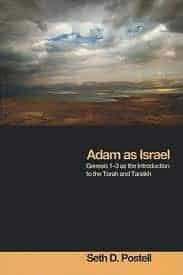 Several months ago, Pickwick Publications was kind enough to send me a copy of Adam as Israel: Genesis 1-3 as the Introduction to the Torah and Tanakh
Several months ago, Pickwick Publications was kind enough to send me a copy of Adam as Israel: Genesis 1-3 as the Introduction to the Torah and Tanakh by Seth D. Postell. This is a brief note on a valuable book for understanding the purpose of the Adam story in Genesis.
As the title suggests, Postell sees Adam not as the first human, but a foreshadowing of Israel. Specifically, Genesis 1-3 is an introduction to the Torah and the Old Testament as a whole. That story is about Israel’s failure to keep the Sinai Covenant (law of Moses), subsequent exile, and a view forward to eschatological renewal.
Postell’s argument is largely a fleshing out of the work of his mentor, John Sailhamer, especially his The Meaning of the Pentateuch: Revelation, Composition and Interpretation. (Postell’s Ph.D. work was done under Sailhamer at Golden Gate Baptist Theological Seminary.)
Bottom line: I think this is a book worth looking into seriously for an understanding of Adam as an Israel figure, rather than the first human, or even a historical figure. (Postell takes a “text-centered” approach and therefore is not occupied with historical issues. It is not clear to me to what extent he holds to a historical Adam, and I am not implying that he would  agree with my arguments in The Evolution of Adam
agree with my arguments in The Evolution of Adam.)
Postell makes many intriguing connections between the Adam narrative and that of Israel. Even if readers find he stretches some points too far, I don’t think readers can escape the overall impact of his argument.
Some things that struck me as I read:
1. Chapter 2 on the history of interpretation is key for showing that “Adam as Israel” is not a recent invention but has rabbinic roots. However, I was hoping for more information on not only rabbinic Judaism but Second Temple and pre-Christian literature. More, I think, could have been and needs to be done in laying out the antiquity of this line of interpretation.
2. Too frequently, Postell seems to go out of his way to distance himself (too quickly, I think) from critical approaches (i.e., Pentateuchal authorship) to the point where it can easily become a distraction.
3. Although too briefly (pp. 32-42), Postell lists modern interpeters who also see the parallels between Genesis 1-3 and Israel’s story in the Old Testament. This, too, could have been expanded, though there is enough there to make the point.
4. Postell’s chapter on methodology (pp. 43-74) reads more like an obligatory dissertation chapter. It is designed to justify his approach to reading Genesis 1-3, but (understandably) it does not contribute specifically to the argument itself. Most readers would likely skim or skip this chapter and nothing of substance would be lost. I think the author’s purposes would have been better served had he simply given due acknowledgment to Sailhamer and alerted the readers that he is following his mentor’s approach and expanding on it (even in those infrequent occasions where he challenges Sailhamer, e.g., p. 93).
5. Postell’s exposition of Genesis 1-3 is smattered with Hebrew words, but they are all translated into English. This should not be an obstacle to most readers.
6. Without wishing to prejudice the matter by offering too many specific instances, on more than a few points, Postell’s arguments to connect the Adam narrative to Israel are thin, whether we are reading his own observations or those of Sailhamer. For example, following Sailhamer, Postell argues that the “land” in Genesis 1:1 (traditionally translated “earth” as in “In the beginning God created the heavens and the earth”) is already referring to Canaan. Another example is seeing the serpent as representative of Canaanite influence on the Israelites, rather than as a (false) wisdom figure.
Postell may occasionally go too far in his reading of Genesis 1-3 as a preview of Israel’s covenantal disobedience, and he may be too dismissive at times of critical scholarship. Generally speaking, however, his Sailhameresque observations about the Adam story cannot be credibly brushed aside as subjective meanderings. “Adam as a preview of Israel” is a position that finds strong–I would go so far as to say overwhelming–support in the text.
If you are interested in a more thorough review of the book that is both fair and critical, you can find one here.
